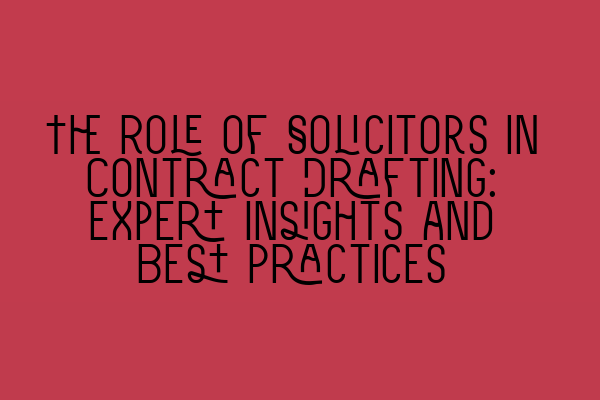In the complex world of contract law, solicitors play a vital role in ensuring that agreements are legally binding, enforceable, and offer protection to their clients. Contract drafting is a specialized skill that requires expertise, attention to detail, and a thorough understanding of legal principles. In this blog post, we will explore the role of solicitors in contract drafting, providing expert insights and best practices.
Why Do You Need a Solicitor for Contract Drafting?
Contract drafting is an art that requires a deep understanding of the law and an ability to foresee potential issues and risks. While it may be tempting to rely on online templates or DIY approaches, hiring a solicitor is essential to ensure that your contract is robust, tailored to your specific needs, and compliant with relevant laws and regulations.
Solicitors bring expertise and experience to the table, empowering you to make informed decisions and negotiate favorable terms. They act as advisors, guiding you through the contractual process and identifying potential pitfalls or loopholes that may otherwise go unnoticed.
The Role of a Solicitor in Contract Drafting
1. Assessing Needs and Objectives:
When drafting a contract, a solicitor will first seek to understand their client’s needs, objectives, and risk tolerance. This initial assessment helps shape the drafting process, ensuring that the contract reflects the client’s intentions and protects their interests.
2. Identifying Legal Requirements:
Solicitors are well-versed in the relevant legal requirements that must be addressed in a contract. They will ensure that the contract complies with statutory obligations, industry regulations, and any other legal considerations specific to the subject matter.
In some cases, solicitors may also need to consider the cultural or jurisdictional implications of the contract, especially in international transactions.
3. Tailoring the Contract to Specific Needs:
No two contracts are the same. A solicitor will meticulously draft and tailor the contract to meet the specific needs and circumstances of their client. This may include structuring the contract, specifying obligations and rights, and incorporating provisions that protect against potential risks.
4. Mitigating Risks and Liabilities:
One of the primary objectives of contract drafting is to mitigate risks and liabilities for both parties involved. Solicitors will identify potential areas of dispute or ambiguity and draft clear, unambiguous clauses to minimize the risk of future conflicts.
5. Negotiating Terms and Conditions:
Contract negotiation is a crucial skill that solicitors bring to the table. They will engage in discussions with the other party to secure the best possible terms and conditions for their client. This may involve negotiating pricing, payment terms, delivery schedules, and any other relevant aspects.
6. Reviewing and Amending Contracts:
Solicitors also play a critical role in reviewing and amending existing contracts. Whether it’s identifying outdated provisions, addressing changes in the law, or revising terms to accommodate evolving business circumstances, solicitors ensure that contracts remain relevant, enforceable, and legally sound.
Best Practices for Effective Contract Drafting
Here are some best practices for effective contract drafting:
1. Clearly Define Parties:
Ensure that the contract clearly identifies the parties involved, using their legal names and addresses.
2. Specify Obligations and Rights:
Clearly outline the obligations and rights of each party, leaving no room for misinterpretation or ambiguity.
3. Use Clear and Concise Language:
Avoid verbose or convoluted language. Use clear and concise terms to enhance understanding and reduce the likelihood of misinterpretation.
4. Address Potential Disputes:
Anticipate potential areas of dispute and include clauses that address how such disputes will be resolved, such as through mediation, arbitration, or litigation.
5. Include Termination Clauses:
Include provisions that outline under what circumstances the contract can be terminated and the rights and obligations that arise from termination.
For a more comprehensive understanding of contract law and to explore related topics, we recommend the following articles:
– Navigating Legal Challenges and Pitfalls in Your Practice
– Barrister vs. Solicitor: A Comprehensive Comparison
– Understanding the SRA Competence Statement: A Guide for Solicitors
– Exploring Different Solicitor Specializations: Finding Your Niche
– Top Recommendations for Law Schools in the UK.
In conclusion, solicitors are invaluable when it comes to contract drafting. Their expertise and experience ensure that contracts are legally sound, protect their clients’ interests, and mitigate potential risks. By following best practices and seeking professional guidance, individuals and businesses can navigate the complexities of contract law and enter into agreements with confidence.
